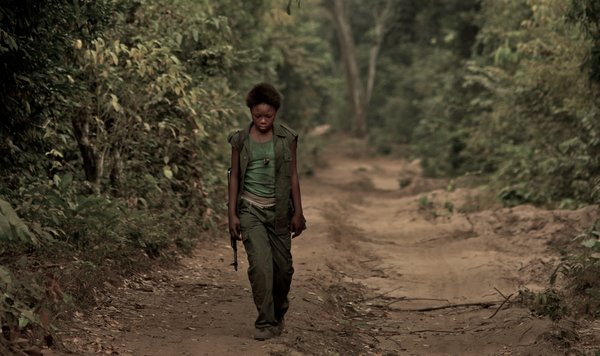Directed by Kim Nguyen
Written by Kim Nguyen
Canada, 2012
The new film War Witch, Canada’s submission into the Best Foreign Language Film category in this past year’s Oscars (and one of the eventual nominees, though it lost to Amour), sidesteps a number of the pitfalls that crop up when any filmmaker tackles a difficult social issue. Over the last decade, the Western world has become more aware of the epidemic in Third World countries of child soldiers, the backdrop of War Witch, otherwise known as Rebelle in its native Quebec. What writer/director Kim Nguyen is able to achieve is a simple, effective, powerful, yet never preachy tale of what it’s like to be one of those soldiers. This film is unflinching, unwilling to look away from the day-to-day atrocities taking place in Africa.
Rachel Mwanza plays Komona, a 12-year old girl who, one day, is snatched up by the rebels in a local civil war in sub-Saharan Africa. Within minutes, she’s told to gun down her parents, cutting ties with the world she grew up in. After she commits this unspeakable act, if only to save her own skin, she becomes one of the soldiers but after imbibing of a so-called “magic milk,” Komona is haunted by ghosts of the dead, who alert her to an attack right before it happens. As she’s the sole survivor, she’s brought to the leader of the rebels, Great Tiger, who believes her to be a lucky charm of sorts, dubbing her a war witch. Komona’s story–which she narrates to the baby gestating in her womb–has further ups and downs, as she connects with a fellow child soldier, an albino boy named Magician, and attempts to escape the iron fist of Great Tiger and his fellow rebels.
Most award-giving bodies seem more than willing to honor such socially conscious dramas, but War Witch is thankfully deserving of the hosannas it’s received. Mwanza, who was found on the streets of the Democratic Republic of Congo, has an immensely challenging part, yet never looks or acts awkwardly. Komona isn’t an extremely external person–thus, though she doesn’t shed excessive tears after her parents die at her own hand, the guilt of the act hangs onto her like a virus. Mwanza’s low-key, yet hyper-focused performance is truly impressive, bursting with naturalism and avoiding any precociousness. The structure of the story also allows the film a fast pace, yet one that doesn’t rush. Komona doesn’t stay in one locale long, moving quickly from her home to Great Tiger’s lair to a forest hideout to more. Not only does the film move briskly through its 90-minute length, but Nguyen is able to simply point his camera at the spare, harsh Congo landscape and deliver alluring, impressive imagery.
One frustrating crutch is the aforementioned voiceover. On one hand, Nguyen’s script tries to sneak its way around an in medias res opening by positing that the narration isn’t directed at the audience, but at Komona’s as-yet-unborn (and potentially unwanted) child. And some aspects of the narration are artful and/or clever, as in one moment where we meet a relative of Magician’s whose family history is apparently so nasty that Komona dare not tell us/the baby because we’ll no longer want to hear the story. But frankly, the narration feels a little heavyhanded. War Witch is most impressive when it’s not trying so hard that you can tell. The story moving backwards from a late point to rewind to the beginning, added with the voiceover, only make it so War Witch stumbles a bit out of the gate.
That aside, War Witch regains its footing after the first few minutes, consistently achieving a sad, yet never editorializing attitude. Nguyen doesn’t directly judge the horrific practice of child soldiers in the Third World–we can make those leaps for ourselves. Narrative fiddling aside, the film is almost journalistic in its approach, presenting an unsparing and direct story of a young woman’s entree into adulthood, the most harrowing way imaginable. Boosted by a stunningly effective and empathetic lead performance from a total unknown, and a confident hand behind the camera, War Witch is terribly sad and effective, all the more impactful because its writer-director is wise enough to not hammer home any social-issues arguments, letting us do all the work instead.
— Josh Spiegel




